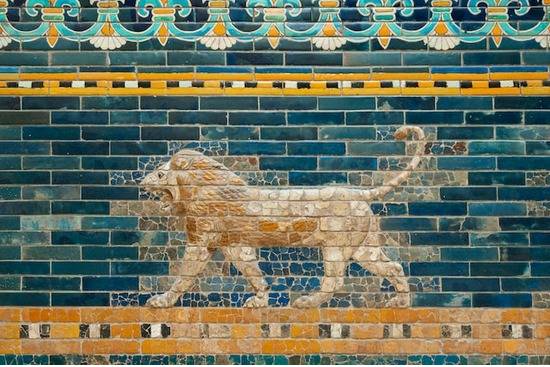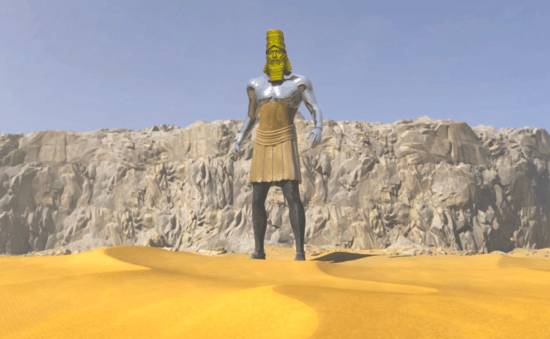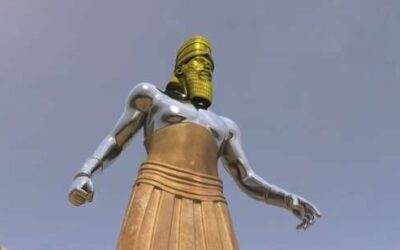Prophets seem like something from novels or movies.
The predictions they make couldn’t actually happen, could they? After all, nobody can tell the future!
At least humans can’t. Right?
Yet, in the Bible, prophecies happened just the way the prophets said they would. These prophets, who had a special relationship with God, received these messages from Him—sometimes through directly hearing His voice or sometimes through visions or dreams.
So, how do we know these prophecies came to pass?
Some biblical prophecies are backed by historical evidence, while other smaller ones are fulfilled later in the Bible. Seeing how these prophecies have unfolded is an enormous reminder of God’s power. It gives us confidence that He will fulfill all the other promises and prophecies that have yet to occur.
So let’s take a look at some of these fulfilled prophecies. We’ll cover three major categories:
Then, we’ll finish off by looking at why Bible prophecies are still important today.
Ancient kingdom prophecies

Photo by Roland Fényes on Unsplash
Ancient kingdom prophecies are prophecies that God gave to help people understand the rise and fall of nations throughout history.
Though the concept of prophecy is a little more strange in modern times, the idea wasn’t all that foreign to the ancient world. Many “prophets” foretold delight and disasters for nations. Kings often had magicians and wise men to tell them the future, too (Genesis 41:8; Daniel 2:2).
Others consulted oracles—people or things believed to hold knowledge from the gods.
The difference between these “prophets” and biblical prophets was the trustworthiness of the messages. The false prophets didn’t really know what would happen, and often their predictions were more like educated guesses. We see the limitations of their abilities in the Daniel 2 story of the wise men who were called by King Nebuchadnezzar and failed to tell him the dream he’d had.
On the other hand, God and His prophets have a consistent track record of fulfilled prophecies, which we can confirm if we turn back the pages of history.
Here are a few prophecies concerning nations of the ancient world.
Israel and Edom
The book of Genesis in the Old Testament tells the story of twin brothers named Jacob and Esau. Before the twins were born, God gave their mother a key prophecy:
“Two nations are in your womb, two peoples shall be separated from your body; one people shall be stronger than the other, and the older shall serve the younger” (Genesis 25:23, NKJV).
This indeed happened.
The oldest, Esau, and his descendants became the nation of Edom, while Jacob and his descendants became the nation of Israel.
As the Israelites left Egypt, the nation of Edom made life difficult for them through wars, raids, and other petty actions (Numbers 20:18). Eventually, though, King David of Israel conquered them (2 Samuel 8:14) and brought them into subservience to Israel, fulfilling the prophecy.
However, they later rebelled against Israel, causing God to pronounce judgment on them. This judgment is found in Jeremiah 49. Here’s a part of what it says:
“Edom shall become a horror. Everyone who passes by it will be horrified and will hiss because of all its disasters…. no man shall dwell there, no man shall sojourn in her” (Jeremiah 49:17-18, ESV).
The Book of Obadiah also lists the judgments of God against Edom.
Later, Edom was conquered by the Nabateans around the time Greece rose to power.1 In Roman times, they resurfaced as the Idumaeans when they sided with Rome during the destruction of Jerusalem in A.D. 70.2
But after that, we no longer find them in historical records.
The destruction of Jerusalem

Photo by Svetlana B
This event was prophesied twice—at two different times in history.
The first time occurs in the Old Testament. Jeremiah delivered this message from God to the people of Judah:
“‘Behold, I will send and take all the families of the north,’ says the Lord, ‘and Nebuchadnezzar the king of Babylon, My servant, and will bring them against this land…and will utterly destroy them, and make them an astonishment, a hissing, and perpetual desolations… [T]hese nations shall serve the king of Babylon seventy years’” (Jeremiah 25:9, 11, NKJV).
True to the prophecy, King Nebuchadnezzar of Babylon raided Judah three times before capturing Jerusalem (Daniel 1:1), destroying the temple (2 Kings 25:9), and hauling the majority of the Jews off to Babylon.3
The Jews remained in Babylon until they were freed during the Medo-Persian rule (Ezra 1:1-4).4
Jerusalem’s second destruction was prophesied by Jesus Christ in the New Testament. Showing His disciples the temple, He told them,
“Do you not see all these things? Assuredly, I say to you, not one stone shall be left here upon another, that shall not be thrown down” (Matthew 24:2, NKJV).
He went on to tell them of other atrocities that would happen, including death, war, and persecution. While this prophecy applies to end-time events, it also directly refers to the Jews in Jerusalem.
A.D. 70 brought the fulfillment of this prophecy. The Romans besieged Jerusalem until they broke down the Jews’ defenses and killed many of them.5 They also destroyed the temple so completely that nothing was left.
Cyrus and the rebuilding of the temple
Coinciding with the prophecy of the first destruction of Jerusalem is Isaiah’s prophecy of the king who would release the Jewish captives, allowing them to rebuild Jerusalem and the temple:
“Who says of Cyrus, ‘He is My shepherd, and he shall perform all My pleasure, saying to Jerusalem, “You shall be built,” and to the temple, “Your foundation shall be laid”’” (Isaiah 44:28, NKJV).
Later, Isaiah relayed that God would direct Cyrus’ actions, and the king would build Jerusalem and let the Israelites return for free (Isaiah 45:13).
Over 200 years later, a king named Cyrus did come to power and defeat Babylon. The discovery of the Cyrus Cylinder in 1879 helped confirm that Cyrus freed all the Babylonian captives and even saw himself as God’s tool in allowing the Jews to rebuild the temple.6
Josephus, the Jewish historian, records the following about this historical event in Antiquities:
“Accordingly, when Cyrus read this [Isaiah’s words], and admired the Divine power, an earnest desire and ambition seized upon him to fulfill what was so written.”7
Babylon’s future

Photo by Corbin Mathias on Unsplash
God had a lot to say about Babylon, the first kingdom to conquer Judah. This kingdom’s poor treatment of the Israelite captives was one of the offenses that would eventually result in it receiving God’s judgments.
Babylon’s immediate destruction was foretold by mysterious writing on the wall during a party put on by the king (recorded in Daniel 5). The king called the prophet Daniel in to interpret it:
“This is the interpretation of each word. Mene: God has numbered your kingdom, and finished it; Tekel: You have been weighed in the balances, and found wanting; Peres: Your kingdom has been divided, and given to the Medes and Persians” (Daniel 5:26-27, NKJV).
That very night, the Medo-Persians invaded Babylon, murdering the king and taking over Babylon (Daniel 5:30).
Greek historian Herodotus later recounted this capture by Medo-Persia, noting that Cyrus got into the impregnable Babylon by diverting the Euphrates River, which ran through the city.8
But that wasn’t all God had to say about Babylon. Jeremiah prophesied that Babylon would one day be “desolate forever” and “a dry land and a wilderness” (Jeremiah 51:26, 43, NKJV).
Today, only dust, wind, and ruins inhabit the spot where Babylon stood, about 50 miles south of Baghdad, Iraq. Saddam Hussein tried to rebuild it in the 1970s,9 but even this failed, showing how accurately Jeremiah’s prophecy happened.
Nebuchadnezzar’s statue
 In Daniel 2, the Babylonian king Nebuchadnezzar received a dream from God that included an important prophecy about successive world empires.
In Daniel 2, the Babylonian king Nebuchadnezzar received a dream from God that included an important prophecy about successive world empires.
The dream was about a statue made of different kinds of metals (Daniel 2:31-35):
- A head of gold
- Chest and arms of silver
- Belly and thighs of bronze
- Legs of iron
- Feet of iron and clay mixed
God gave Daniel the interpretation of the king’s dream, telling him that the different metals represented kingdoms, each succeeding the one before it (Daniel 2:39-44).
The first metal, gold, represented Babylon (Daniel 2:38). Babylon was the most powerful kingdom in the known world at that time.
Medo-Persia, the next world power, conquered Babylon in 539 B.C.10
After Medo-Persia came Greece with Alexander the Great as ruler.
Rome conquered Greece in the 100s B.C.11
When Rome divided and finally crumbled in the early centuries after Christ, several smaller countries rose from it in Europe, including France, Italy, Germany, and England. This fulfilled the feet.
Besides prophetic revelations about kingdoms, the Bible is filled with Messianic prophecies that Jesus fulfilled. We’ll cover those next.
Messianic prophecies
Ever since sin entered the world, God’s people knew someone would deliver them from it someday. After Adam and Eve sinned by choosing to distrust God’s guidance, God came to them and explained to them the consequences of their actions. He also offered them hope through the words He spoke to the serpent, Satan:
“And I will put enmity between you and the woman [Eve], and between your seed and her Seed; He shall bruise your head, and you shall bruise His heel” (Genesis 3:15, NKJV).
God’s people had a promise that they would be saved from the curse of sin. This deliverance would come through someone the Jews called the Messiah.
Prophecies concerning the Messiah pepper the Old Testament, and many hundreds of years later, they came to pass in the life of Jesus.
Jesus’ birth
Prophets described many aspects of Jesus’ birth long before it happened.
Take Isaiah 7:14 for example:
“Therefore the Lord Himself will give you a sign: Behold, the virgin shall conceive and bear a Son, and shall call His name Immanuel” (NKJV).
Jesus was indeed born of the virgin, Mary, as recorded in Luke 1:26-35.
And the following prophecy discusses His birthplace:
“But you, Bethlehem Ephrathah, though you are little among the thousands of Judah, yet out of you shall come forth to Me the One to be Ruler in Israel, whose goings forth are from of old, from everlasting” (Micah 5:2, NKJV).
Though Joseph and Mary didn’t live in Bethlehem, they ended up there because of a census in the Roman Empire that required them to travel there and register. There, Mary gave birth to Jesus (Luke 2:4-7).
The fact that Jesus fulfilled both of these prophecies is astonishing enough, but there’s more.
Jesus’ ministry

Photo by Rodolfo Clix
Prophets foretold many facets and circumstances surrounding Jesus’ ministry and death centuries before they happened.
The overarching prophecy concerning the ministry and death of Jesus is called the 70-week prophecy. Found in Daniel 9:24-27, the time period began when the Jews returned from exile in 457 B.C., and it pinpoints the exact three and a half years of Jesus’ ministry before His crucifixion.
Here are a few more prophecies dealing specifically with His ministry:
- Jesus and His claims to be the Son of God would be rejected by His brothers (Psalm 69:8; John 7:3-5).
- He would tell parables during His ministry (Psalm 78:2; Matthew 13, 25).
- He would perform miracles (Isaiah 35:5-6; Matthew 11:2-6).
- He would come into Jerusalem on a donkey, an event known as the triumphal entry (Zechariah 9:9-10; Matthew 21:1-11).
Jesus’ suffering and death
God gave the Old Testament prophets many prophecies of Jesus’ death because it would be such a significant event for humanity.
Let’s look at several:
- Jesus would be betrayed for thirty pieces of silver (Zechariah 11:12-13), which is exactly what Judas Iscariot, one of Jesus’ disciples, did (Matthew 26:15).
- Jesus would be bruised and whipped on the way to the crucifixion, where He would die for our sins (Isaiah 53:5).
- He wouldn’t lash out or try to escape His tormentors (Isaiah 50:6; Matthew 27:30).
- His hands and feet would be pierced (Psalm 22).
- Soldiers would cast lots for Jesus’ clothing (Psalm 22:18; Matthew 27:35).
- Not one of His bones would be broken (Psalm 34:20). The Jews had asked Pilate to break the legs of everyone being crucified to speed up their death. But Jesus had already died, so His bones were not broken (John 19:31-32).
Jesus’ resurrection and ascension

Photo by Pisit Heng on Unsplash
The Old Testament has quite a bit to say about Jesus’ resurrection, too. Psalm 16, for example, states,
“Therefore my heart is glad, and my glory rejoices; My flesh also will rest in hope. For You will not leave my soul in Sheol, nor will You allow Your Holy One to see corruption. You will show me the path of life; in Your presence is fullness of joy; at Your right hand are pleasures forevermore” (Psalm 16:9-11, NKJV).
Jesus Himself even said He would rise from the dead in three days:
“Jesus answered and said to them [the Jews], ‘Destroy this temple, and in three days I will raise it up’” (John 2:19, NKJV).
The only thing was, nobody understood what He was saying at the time. The Jews scoffed at Him because they had spent 46 years building the temple in Jerusalem. But, as John indicates, Jesus was using temple to symbolize His body (John 2:20-21). After Jesus resurrected on the third day, His disciples realized this and connected the dots (John 2:22).
Jesus’ ministry on earth moved to heaven when He ascended there. The timing of His work as high priest in the heavenly sanctuary is foretold in the 2,300-day prophecy of Daniel 8:14.
For more about the prophecies Jesus fulfilled, we have a whole page discussing the ways you can find Jesus in the Old Testament.
Now, let’s turn to another important category of prophecy.
End-time prophecies
End-time prophecies foretell events that will happen during the time before Jesus returns at the Second Coming. Many of these prophecies are in the books of Revelation, Matthew, and Daniel.
Some of these prophecies have been fulfilled, but others are in the process of being fulfilled or haven’t been yet. However, world trends indicate that these unfulfilled ones will come to pass soon.
Here are some of the fulfilled ones:
Signs of Jesus’ coming
Matthew 24 and Luke 21 highlight signs that Jesus’ return is near. Earlier, we looked at Matthew 24’s application to the destruction of Jerusalem in A.D. 70, but now we’ll see how this prophecy applies to the end times. It mentions the following events:
- Wars and rumors of them (Matthew 24:6; Luke 21:9-10)
- Famine and disease (Matthew 24:7; Luke 21:11)
- Natural disasters (Matthew 24:7; Luke 21:11)
- Persecution (Matthew 24:9-10; Luke 21:12, 16)
- Strange phenomena in the sky (Matthew 24:29; Luke 21:25)
Although these are not the sole indicators of the end of the world, they have been popping up in the news and letting us know we’re getting closer.
People in the last days

Photo by Obi – @pixel8propix on Unsplash
The Bible has a lot to say about people in the end times.
2 Timothy 3:1-5 tells us the characteristics of many of these people. They will be:
- Lovers of themselves and pleasure (verses 1, 4)
- Lovers of money (verse 1)
- Boastful, haughty, and proud (verses 1-2)
- Unholy and dishonoring to God (verse 1)
- Disobedient to their parents and traitors (verses 1, 4)
- Unthankful, unloving, unforgiving (verses 1-2)
- Brutal, without self-control, headstrong, and slanderous (verses 3-4)
That’s a rather terrifying list!
Yet we see these characteristics more and more in today’s materialistic culture. People value power, wealth, and things more than other people, creating a lot of the turmoil that we see all around us.
The apostle Peter also warns Christians that false prophets and false christs will arise in the midst of all these other people. These false prophets will lead many people astray (2 Peter 2:1-2).
Peter also says that many in the end times will scoff at the teachings of the Bible, denying its accounts of Creation and the Flood and questioning whether the Second Coming will actually happen (2 Peter 3:3-6).
It doesn’t take more than a glimpse at the news and society to recognize many of these signs being fulfilled. Thankfully, these signs can encourage us that Jesus will soon return and deliver us from our struggling and chaotic world.
Why Bible prophecies are important today
Bible prophecies—and their fulfillment—encourage us that God knows what’s going to happen in the future. We may not have that knowledge, but we have the privilege of knowing Someone who does.
God knows what’s going to happen not only to major world empires but also to our individual lives. He has a plan for our future and wants to help us toward that plan (Jeremiah 29:11).
Some of the prophecies are specifically given to call us to prepare. For example, during the time of the Bible character Joseph, Pharaoh of Egypt received a prophecy about a coming famine so that Egypt could prepare for it (Genesis 41). Similarly, today we have prophecies about end-time events so we can prepare for what’s coming. Not to be afraid of those events, but to be aware of them.
Seeing all the past prophecies fulfilled gives us a sense of comfort. We can trust Jesus to fulfill the future prophecies in the Bible because He’s already proven time and again that He always fulfills them to the letter.
And this is perhaps most significant when we think about His promise to return and save us (John 14:1-3). Because He promised that, we can trust that He will indeed return.
He hasn’t failed yet.
Ready to dive into more prophecies?
Choose an Online Bible Study
Want to keep learning? Find out more about Jesus, humanity, the plan of salvation, and how God loves you enough to sacrifice everything, just to give you a chance to choose Him.
Sometimes it can be hard to know where to start, that’s why we offer free, user-friendly, online Bible study options you can do anytime, anywhere, and at your own pace.
This online Bible school will take you through the major themes of Scripture, breaking down the Bible’s complex concepts into bite-sized pieces, which can lead you toward the answers of life’s more challenging questions.
Related pages
- “Edomites,” Livius.org. [↵]
- Ibid. [↵]
- “Babylonian Captivity,” Encyclopedia Britannica. [↵]
- Ibid. [↵]
- Lohnes, Kate, “Siege of Jerusalem,” Encyclopedia Britannica. [↵]
- Jackson, Wayne, “The Cyrus Decree,” Christian Courier. [↵]
- Quoted in ibid. [↵]
- “Herodotus on Cyrus’ Capture of Babylon,” Livius.org. [↵]
- Magid, Pesha, “Inside the Abandoned Babylon That Saddam Hussein Built,” Atlas Obscura. [↵]
- Nijssen, Daan, “Cyrus the Great,” World History.org, February 21, 2018, https://www.worldhistory.org/Cyrus_the_Great/. [↵]
- “What To Know About the Roman Conquest of Greece,” Greek Boston.com, https://www.greekboston.com/culture/ancient-history/roman-conquest/ [↵]
More Answers
How Does God Want Me to Use My Money?
The Bible offers lots of wisdom on the best ways we can use our money. Learn what the Bible says about tithe, offering, providing, debt, savings, investing, and budgeting.
What Does the Bible Say About Heaven?
The afterlife is something on all of our minds. Whether Christian or not, human beings have a natural longing to understand what’s next. And nearly every religion has some kind of explanation for it.
What the Bible Says About Money
From stewardship to acts of investment and generosity, let’s explore what the Bible says about having a healthy relationship with our money.
Death
Have you ever wondered about life after death, or what some refer to as the afterlife?
What Does God Look Like According to the Bible?
What Does God Look Like According to the Bible?As human beings, it’s natural for us to wonder about God’s appearance. But the Bible says very little about it. It’s not hard to understand why, though. As the Creator of the entire universe, His existence transcends our...
What Does the Bible Say About Aliens and UFOs?
In 1938, aliens and UFOs were the subject of a mass prank. Around Halloween, Orson Welles performed a radio adaptation of H.G. Wells’ War of the Worlds. This ended up causing a panic throughout the United States—many people took it to mean that aliens had really attacked New Jersey.
The Seven Churches of Revelation and What They Mean
The seven churches were churches that received messages from Jesus Christ through the apostle John while he was exiled on the island of Patmos. These letters are in chapters 2 and 3 of Revelation.
What Is the Statue in Nebuchadnezzar’s Dream?
Ever had a dream you couldn’t remember? You know it was disturbing, but the details escape you. Ugh, the frustration!
What Are the Three Angels’ Messages in Revelation 14?
The three angels’ messages in Revelation 14 warn the world to worship God, leave religious confusion, and avoid worship of human traditions instead of God’s commands.
The Early Christian Church [Overview]
The Early Christian Church describes the faith community that developed from followers of Jesus after He returned to heaven (Acts 1) in A.D. 31. Their purpose was to be witnesses of the life, death, and resurrection of Jesus and grow their faith community into a worldwide movement.
All About the 2300-Day Prophecy and the Investigative Judgment
This page will explain what the 2300-day prophecy is about. We’ll especially be looking at what events marked its fulfillment and what it has to do with the Investigative Judgment.
What Is the 70-Week Prophecy in Daniel 9
Could a prophecy accurately predict an event over 500 years before it was supposed to happen?
The 70-week prophecy of Daniel 9 did, culminating in one of the most important events in earth’s history: Jesus’ sacrifice for us on the cross.
What Does the Bible Say About the End Times?
First of all, when we say “end times,” this refers to the period of time that precedes the second coming of Jesus—and the end of this sinful world before it’s recreated into the new earth. And several passages of Scripture provide us with clues and guidelines to help us recognize when these times are near, what kinds of things we can expect, and what it might mean for our daily lives and priorities.
The Creation of the World: What the Bible Really Says
When we think about the biblical Creation story, we think of just that: the world being created by the Creator. And while God’s creation of the world is marvelous and miraculous in its own right, it’s about far more than the sudden appearance of plants, animals, and humans.
Healing in the Bible
Have you ever felt like healing seemed so far away? Like it wouldn’t be possible for you? What you most want is a glimmer of hope or a bit of encouragement.
How Do You Tell a False Prophet From a True Prophet?
The Bible speaks of both true and false prophets and gives us specific guidance on how to test prophets and their claims. Scripture is our guard against deception.
Didn’t find your answer? Ask us!
We understand your concern of having questions but not knowing who to ask—we’ve felt it ourselves. When you’re ready to learn more about Adventists, send us a question! We know a thing or two about Adventists.















![The Early Christian Church [Overview]](https://www.askanadventistfriend.com/wp-content/uploads/2023/01/old-temple-400x250.jpg)





